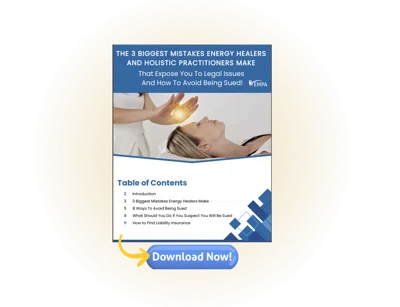What To Do in the First 24 Hours After a Client Incident as an Energy Healer
September 10th, 2025
4 min read
By Anya Charles

What actually counts as a “client incident?”
And if something feels off after a session, what should happen next — if anything?
It might be a client expressing discomfort. A vague concern that shows up hours later. Or a situation that doesn’t feel like a crisis, but still leaves you uncertain.
In moments like these, it’s easy to hesitate. Do you respond? Wait and see? Something else?
In this article, you’ll learn what to do in the first 24 hours after a client concern — whether it’s a minor miscommunication or something more. We’ll cover what counts as an incident, walk through a 9-step checklist to protect your practice, and show how early response can actually build trust.
 What Counts as a “Client Incident” in Energy Healing?
What Counts as a “Client Incident” in Energy Healing?
Not every uncomfortable moment in a session is an “incident.” But there are times when a client’s reaction, response, or concern deserves attention — even if it seems minor at first.
It might look like…
- A client reporting lingering dizziness, nausea, or emotional overwhelm after a session
- A concern raised about touch, language, or something that felt unclear or unexpected
- A request for clarification, a refund, or even just a follow-up conversation that carries emotional weight
- A situation where the client feels the session “didn’t feel right,” even if nothing specific is named
Sometimes these concerns come up immediately. Other times, they surface days later through email or text, after a client has had time to process.
What matters isn’t whether the situation feels big or small; what is important to recognize is if it signals a potential miscommunication, discomfort, or risk from the client’s perspective. In those cases, it’s worth treating the moment with care.
💡 Tip: If you're unsure whether something counts as an incident, it’s often safer to treat it as one. Documenting and responding with calm professionalism is rarely a misstep — but ignoring or dismissing concerns can carry greater risk.
 A Hypothetical Example: How One Healer Handled a Client Concern
A Hypothetical Example: How One Healer Handled a Client Concern
Imagine a practitioner offering a guided breathwork session. The client appeared relaxed and content afterward. But later that evening, they sent an email describing unexpected lightheadedness and unease — unsure if the session had been “too intense.”
The practitioner didn’t panic. They took a moment to ground themselves and responded with empathy, offering space to talk and checking in on how the client was doing.
Because they approached it calmly and professionally, the client felt heard — and nothing escalated. In fact, the experience strengthened the client’s trust in the practitioner’s care.
This kind of situation doesn’t mean you’ve done anything wrong. But it does highlight the power of presence, responsiveness, and documentation in keeping both you and your client supported.
💡It's a reminder that being responsive doesn’t mean you’ve done something wrong — it simply shows you’re committed to safe, professional practice. For more on how energy healers can face claims even when their intentions are clear, see: Can You Really Be Sued for Something You Didn’t Do?
What To Do After a Client Incident: A 9-Step Checklist for Energy Healers
If something doesn’t feel quite right after a session — or a client reaches out with a concern — this checklist can help you take thoughtful, professional action. You don’t have to rush through it, but completing these steps within the first 24 hours helps protect your clients and your practice.
 Pause and ground yourself: Take a moment to breathe and settle. How you show up — emotionally and energetically — can shape how the conversation unfolds.
Pause and ground yourself: Take a moment to breathe and settle. How you show up — emotionally and energetically — can shape how the conversation unfolds.
 Review your documentation: Locate the signed intake form, informed consent, session notes, or aftercare instructions. These help clarify what was shared and agreed upon.
Review your documentation: Locate the signed intake form, informed consent, session notes, or aftercare instructions. These help clarify what was shared and agreed upon.
 Acknowledge the client’s experience: If they’ve contacted you, respond using neutral, respectful language. A simple “Thanks for letting me know — I’d like to understand how you’re feeling” is often enough to open the door without admitting fault.
Acknowledge the client’s experience: If they’ve contacted you, respond using neutral, respectful language. A simple “Thanks for letting me know — I’d like to understand how you’re feeling” is often enough to open the door without admitting fault.
 Ask what they need or feel is fair: Some clients may just want reassurance or clarification about the session. Others might claim to have been negatively affected and ask for a refund. Offering a short follow-up conversation or even a goodwill refund can be supportive without suggesting wrongdoing.
Ask what they need or feel is fair: Some clients may just want reassurance or clarification about the session. Others might claim to have been negatively affected and ask for a refund. Offering a short follow-up conversation or even a goodwill refund can be supportive without suggesting wrongdoing.
 Stay within your scope of practice: If the concern involves mental health, medical symptoms, or anything beyond your scope, refer the client to a licensed professional. This protects everyone involved.
Stay within your scope of practice: If the concern involves mental health, medical symptoms, or anything beyond your scope, refer the client to a licensed professional. This protects everyone involved.
 Set respectful communication boundaries: If messages start coming frequently or feel overwhelming, it’s okay to set limits. Let them know when and how you’ll respond so you can stay focused and present.
Set respectful communication boundaries: If messages start coming frequently or feel overwhelming, it’s okay to set limits. Let them know when and how you’ll respond so you can stay focused and present.
 Document everything: Keep a dated record of messages, emails, and any follow-up conversations. Even if nothing escalates, this gives you a clear history to refer back to.
Document everything: Keep a dated record of messages, emails, and any follow-up conversations. Even if nothing escalates, this gives you a clear history to refer back to.
 Reflect on your session language: Did anything you said unintentionally create a sense of promise, diagnosis, or expectation? Reviewing your language helps you strengthen clarity for future sessions.
Reflect on your session language: Did anything you said unintentionally create a sense of promise, diagnosis, or expectation? Reviewing your language helps you strengthen clarity for future sessions.
 If you’re an EMPA member, reach out! Even if you’re not sure it’s “serious,” you don’t have to navigate it alone. EMPA can help you determine next steps — and support you if anything develops later.
If you’re an EMPA member, reach out! Even if you’re not sure it’s “serious,” you don’t have to navigate it alone. EMPA can help you determine next steps — and support you if anything develops later.
 What’s Next: Avoid Mistakes Before They Happen
What’s Next: Avoid Mistakes Before They Happen
The steps you take in the first 24 hours after a client incident can make all the difference — but even more powerful is knowing how to prevent common issues in the first place.
That’s why we created the guide: The 3 Biggest Mistakes Energy Healers Make — and How to Avoid Them.
Inside, you’ll find insights on things like:
- Why not documenting client concerns can leave you exposed
- How subtle language in sessions can blur professional boundaries
- What many practitioners overlook when it comes to liability coverage
Whether you’ve faced a client concern before or just want to be prepared, this free guide offers tools to strengthen your practice from the ground up.
Download the 3 Biggest Mistakes Guide
(Free. Practical. Built for real-world energy healing.)
Disclaimer: This article is for educational purposes only and does not provide legal, financial, or medical advice. The examples are general, and coverage may vary by policy. Always refer to your insurance provider or policy language for specific details, as the policy terms take precedence. For legal concerns related to your practice, consult an attorney.
Anya is a writer with a passion for inspiring those around her. She is the Content Manager at EMPA, where she works closely with subject matter experts to turn their insight into articles that inform, support, and empower the energy healing community. With over a decade of experience in the wellness world, she enjoys making complex ideas feel accessible and meaningful. Whether she’s writing new pieces or polishing others, Anya’s focus is on helping others grow their clarity and professionalism. She also serves as Editor in Chief of Energy Magazine, a unique publication dedicated to the world of energy medicine. Outside the office, you’ll find Anya reading, planning travel adventures, or negotiating peace treaties with her houseplants.
Topics:

.png?width=1326&height=405&name=EMPALogo_final_white-01%20(1).png)


























